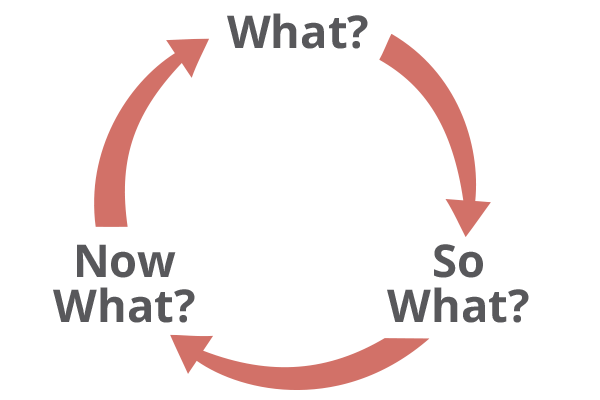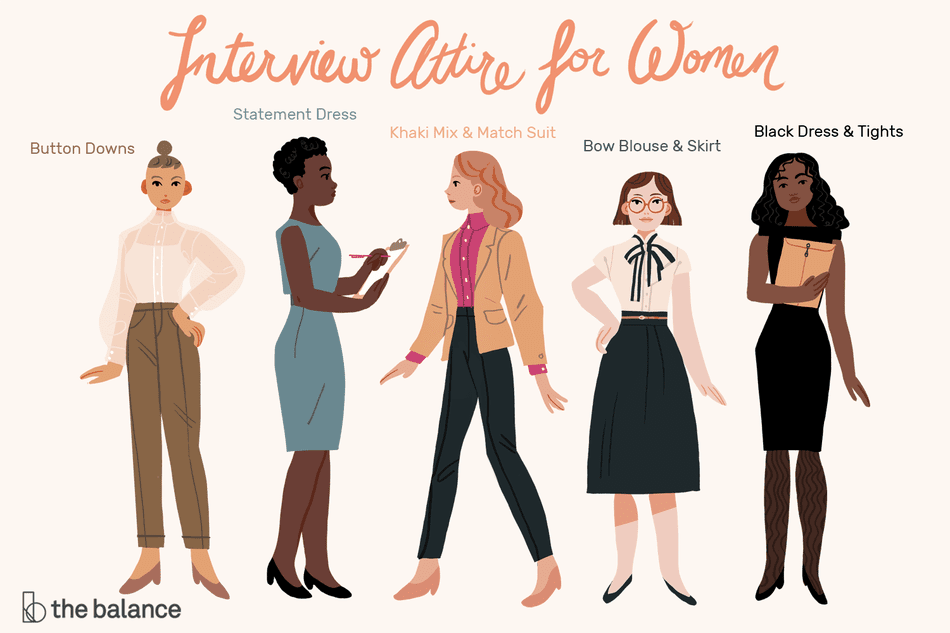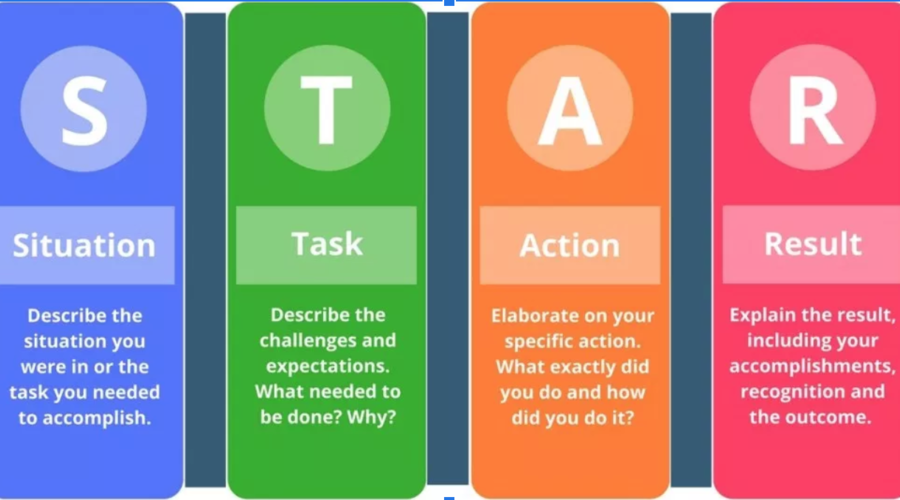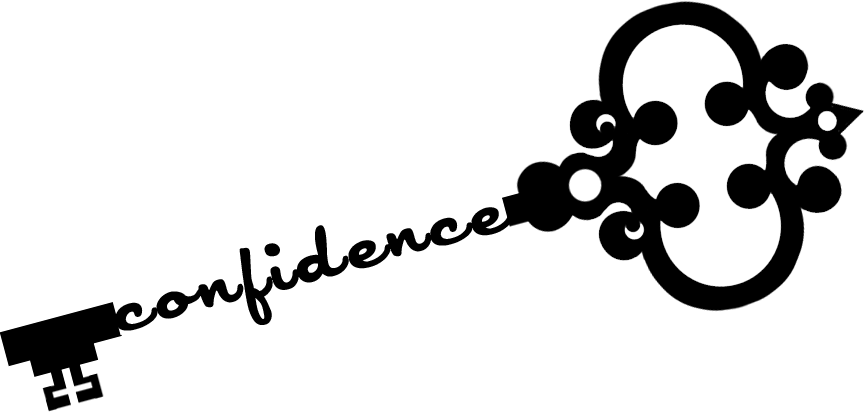The Mind Blank
A job interview is when an employer ‘asks you questions about your career, personality and life and you answer honestly while trying to impress them.’[1] Seems easy, doesn’t it? Not when your mind goes completely blank second question in! I was so grateful for the opportunity to undertake a simulated job interview so that I could get an insight into what it might be like when being interviewed for a teaching position in the future. I am also very grateful that this was not a genuine secondary school drama teacher job interview! In this blog I will reflect on my experience of my simulated interview using Borton’s model of reflection to describe what happened, why it happened and what I will do differently in the future.
Borton’s Model of Reflection
Terry Borton developed his model of reflection in 1970, his model is described as being a ‘What, So What, Now What sequence of reflective education that also acts as a framework for reflective practice’[2], with Borton himself stating, ‘it provides an organised way of increasing awareness (What), evaluating information (So What), and experimenting with new behaviour (Now What).’[3]
We’ll start at the beginning, shall we? I felt confident, honestly I did! I felt professional in my attire and thought I looked quite well (a rare occurrence) which I knew was important as at a job interview first impressions are crucial, ‘your clothes, hair and shoes will all be viewed as indicators of your status, self-confidence, self-care and self-worth.’[4] On the train journey to my simulated interview I was feeling prepared as I read over (what I thought to be) memorised responses to popular interview questions and familiarised myself with background information that I had studied from the school’s prospectus, for example, the schools general outcomes for its pupils. I even talked with the drama teachers in my placement school of how their job interviews went to get an idea of what I was going into! Suzanne Lucas tells us that ‘no matter how sparkly your personality is, you have to do the background research’[5], and I did. I was aware when walking into the interview that you don’t get a second chance at making a first impression and that body language was important. I knew I had to portray confidence (even if I wasn’t feeling so confident) and as a final year drama student I believe this was something that I was very much capable of because of my experience in auditioning. We can relate a job interview to an audition where ‘the hellos and goodbyes between you and the creatives are crucial moments and giant opportunities to make your impression.’[6] I had the mindset that if I treat this interview like an audition for the role of a drama teacher then I should be fine. I approached my two interviewers with a strong, confident stride and good posture because I know that in an audition, ‘posture is everything […] and that nervousness could lure you into a physically submissive stance like hunching, drawing shoulders forward and eyes down’[7], which could make you look unsure of yourself. That’s not what I wanted. I wanted to project confidence so I kept my shoulder’s back and greeted both interviewers with eye contact, a confident smile and I would’ve firmly shaken their hand if it wasn’t for covid-19.[i]
Where it all went wrong…
It was really after I sat down on the interviewee’s chair that everything went slightly askew. I was aware from listening to the careers advisor that I did the right thing in relating the first ‘tell me about yourself..’ enquiry to my experience and knowledge in the field of drama teaching, but from the second question onward, my mind went completely blank. I mean blank. I forgot my prepared responses to the interview questions asked and my ‘memorised’ background research just vanished. I was thrown off guard by questions that I should have easily been able to answer, for example, ‘how would you develop a school production?’ and was sure that there was no chance of redemption. I was waffling responses, completely diverting from the question and using words such as ‘um, em, eh’ too much. I knew deep down that these ‘fillers tell the interviewer that you’re not prepared’[8] but I felt completely mind boggled and unable to string a sentence together! I had to try and pull this together.
‘Lots of interviewers are going to ask you to “tell me about a time when …” followed by something appropriate for your field.’[9] Luckily the question that followed this horrendous ordeal of the mind blank was, ‘tell me about a time when you encountered and overcame a difficulty within the drama classroom?’ I know that it is crucial during interview to draw on your own personal experience of teaching within the field and this question was the perfect opportunity to discuss just that (and to try and save myself!). I talked of a time during placement when I had to undergo warm up exercises with a class of year nine students, one of which was hearing impaired. I discussed this situation in relation to the S.T.A.R. technique that I was made aware of through our careers advisor and feel that this question was answered well. I firstly discussed the Situation: having to explain and undertake drama warm up exercises with a class that included a hearing-impaired student. Then the Task: having to ensure that this pupil understood the exercises just as well as the other pupils, meaning that she could become fully immersed in the activity. I then described my Action: I had to wear a device around my neck that was connected to an earpiece, enabling the students to hear me better, I had to take off my mask when speaking to her so she could lip read and stand close to her when explaining, using as many hand gestures as possible in descriptions so that she could fully understand. Finally, I shared my Result with the interviewers: the student being able to become fully immersed in the activity, enjoying it and developing her drama skills along the way.
The following question was, ‘How would you develop and direct a school production and what would this be?’ This question threw me off completely, it wasn’t a hard question, just something I didn’t even consider being asked, I was thrown off script and therefore became evidently anxious. I tried to respond to the best of my ability but when conjuring up my answer I was diverting eye contact, pausing and therefore my nervousness was clear. In response to this question (after the anxiety began to subside a little) I discussed the possible development and execution of ‘The Wizard of Oz’ as a school production. I discussed why I chose this piece- it is something that everyone is familiar with and because it is a musical, a lot of student involvement is evoked through the aspects of not only acting but set design, dancing, singing, costume design and sound design. I believe that in the end I answered this question adequately under the circumstances, but I most definitely will be more prepared for unexpected questions in future interviews. Towards the end of the interview I was asked if I had any questions for the interviewers, I was aware that you must have questions prepared to show interest in the role and thank goodness I remembered what I had planned to ask the interviewers (unbelievably quite a decent question), ‘do you have any training opportunities within the school for teachers?’ I believe I may have redeemed myself in some way by having a question ready to ask that displayed an interest in the role, but it’s safe to say I was happy when the time came to say ‘thank you for giving me this opportunity’ as I made my way for the door.
I witnessed my peers perform very well in their simulated interviews, one of which was very prepared with evident confidence in remembering her very well-structured responses. This led to a smooth delivery of answers throughout the interview, diminishing any nerves that she might have felt. The other student in our group seemed to be able to relate every response to her own personal experience within the teaching field, which was very impressive, these observations are definitely ones that I will take away from this task and employ to future job interviews. My two peers provided constructive feedback, praising me on my use of eye contact throughout, my positive and confident body language and my relation to previous personal experience within the field. Although, I believe that I would’ve benefitted from more constructive criticism through this feedback so that I could more effectively learn from my mistakes. Jawaher Mohammed Alzaid tells us that ‘among the many criticisms directed at peer assessment is the difficulty of achieving acceptable levels of honest and reliable assessment results’[10], with Elander stating that ‘many studies confirm that the issues of honesty and credibility are the most difficult in student assessment.’[11] Even so, I will take away my peer feedback from this task and apply it to future interviews.
Now What?
I learnt a lot from this simulated interview, points that I can reflect on and change when it comes to genuine job interviews. In the future I will ensure that I completely memorise my background research on the school that I wish to teach in, also memorising points to discuss in response to well-known teaching interview questions, meaning if I have a mind blank, I have something concrete to fall back on! I will ensure that I incorporate my relevant experience into as many responses as I can to show that I have first-hand knowledge of working in the field of drama teaching. Through this experience I have learned that you must prepare to be asked unexpected questions and don’t be so concrete on adhering to a mental ‘script’ as it increases your anxiety when something comes up that throws you off guard. If this is the case and you are asked a completely unexpected question, you must relax, take a deep breath and understand that it’s better to pause for a few seconds so that you can develop a strong answer rather than waffle, use too many filler words or go completely off topic because of nerves. From undertaking this task, I am now aware of what I must work on for future interviews and on what I already do quite well. My biggest takeaway is that confidence is key, you must believe in yourself and sell yourself as best as you can, even if you don’t feel that there is much to sell (fake it to you make it)! If you can do this and not talk gibberish like myself in a mind blank, you might just bag the job!
References
[1] Totaljobs Group Ltd, What is a job interview? (2022) <https://www.totaljobs.com/advice/what-is-a-job-interview> [accessed 7 February 2022].
[2] John Dabell, Borton’s Model Of Reflection (2022) <https://johndabell.com/2018/08/05/models-of-reflection/> [accessed 7 February 2022].
[3] Ibid.
[4] Totaljobs Group Ltd, What is a job interview? (2022) <https://www.totaljobs.com/advice/what-is-a-job-interview> [accessed 7 February 2022].
[5] Suzanne Lucas, ’10 Interview Skills You Need to Get Hired (and How to Improve at Them)’, Inc., (2016) in <https://www.inc.com/suzanne-lucas/10-interview-skills-you-need-to-get-hired-and-how-to-improve-at-them.html> [accessed 7 February 2022].
[6] Erika Shannon, ‘3 Simple Body Language Tricks That Will Make a Big Impression at Auditions’, Backstage, (2021) in <https://www.backstage.com/magazine/article/simple-body-language-tricks-will-make-big-impression-auditions-4794/> [accessed 7 February 2022].
[7] Ibid.
[i] For more information on good body language for a job interview see: https://www.inc.com/minda-zetlin/ss/body-language-mistakes-even-smart-people-make.html
[8] Diane Diresta, ‘Six Sloppy Speech Habits’, Monster, (2022) in <https://www.monster.com/career-advice/article/six-sloppy-speech-habits> [accessed 8 February 2022].
[9] Suzanne Lucas, ’10 Interview Skills You Need to Get Hired (and How to Improve at Them)’, Inc., (2016) in <https://www.inc.com/suzanne-lucas/10-interview-skills-you-need-to-get-hired-and-how-to-improve-at-them.html> [accessed 7 February 2022].
[10] Jawaher Mohammed Alzaid, ‘The Effect of Peer Assessment on the Evaluation Process of Students’, International Education Studies, 10.6, (2017), 159-173 (p. 161), in <https://doi.org/10.5539/ies.v10n6p159> [accessed 8 February 2022].
[11] J. Elander, ‘Student assessment from a Psychological Perspective’, Psychology Learning & Teaching, 3.2, (2004), 114-121, in <https://doi.org/10.2304/plat.2003.3.2.114 > [accessed 8 February 2022].
Bibliography
Quotes/References
Alzaid, Jawaher Mohammed, ‘The Effect of Peer Assessment on the Evaluation Process of Students’, International Education Studies, 10.6, (2017), 159-173 (p. 161), in <https://doi.org/10.5539/ies.v10n6p159> [accessed 8 February 2022]
Dabell, John, Borton’s Model Of Reflection (2022) <https://johndabell.com/2018/08/05/models-of-reflection/> [accessed 7 February 2022]
Diresta, Diane, ‘Six Sloppy Speech Habits’, Monster, (2022) in https://www.monster.com/career-advice/article/six-sloppy-speech-habits [accessed 8 February 2022]
Elander, J., ‘Student assessment from a Psychological Perspective’, Psychology Learning & Teaching, 3.2, (2004), 114-121, in <https://doi.org/10.2304/plat.2003.3.2.114 > [accessed 8 February 2022]
Lucas, Suzanne, ’10 Interview Skills You Need to Get Hired (and How to Improve at Them)’, Inc., (2016) in <https://www.inc.com/suzanne-lucas/10-interview-skills-you-need-to-get-hired-and-how-to-improve-at-them.html> [accessed 7 February 2022]
Shannon, Erika, ‘3 Simple Body Language Tricks That Will Make a Big Impression at Auditions’, Backstage, (2021) in <https://www.backstage.com/magazine/article/simple-body-language-tricks-will-make-big-impression-auditions-4794/> [accessed 7 February 2022]
Totaljobs Group Ltd, What is a job interview? (2022) <https://www.totaljobs.com/advice/what-is-a-job-interview> [accessed 7 February 2022]
Images and Media
Borton’s Model of Reflection: Creative Commons , Reflective Writing (2022) <https://writeonline.ca/media/images/re_what-sowhat-nowwhat.png> [accessed 7 February 2022]
Interview Attire for Women: The Balance Careers , The Best Interview Attire for Women (2021) <https://www.thebalancecareers.com/interview-outfits-for-women-2061091> [accessed 7 February 2022]
Canva Multimedia: Canva, Keep Calm Everything Will Work Out (2022) <https://www.canva.com/design/DAE4piiVJTs/DbD5eYmegPLSwEwFvyZaYQ/watch?utm_content=DAE4piiVJTs&utm_campaign=designshare&utm_medium=link&utm_source=publishsharelink> [accessed 8 February 2022]
S.T.A.R. Image: Design and Build , Quantify your career highlights with the STAR method of resume writing (2022) <https://www.designandbuild.com.au/blog/2019/07/quantify-your-career-highlights-with-the-star-method-of-resume-writing> [accessed 8 February 2022]
Confidence is Key Image: The Financial Planning Group, When Confidence Is Absolutely Key(2022) <https://www.fpgonline.co.uk/index.php/when-confidence-is-absolutely-key/> [accessed 8 February 2022]
Links
1: [i]: Inc. , 21 Common Body Language Mistakes Even Smart People Make (2022) <https://www.inc.com/minda-zetlin/ss/body-language-mistakes-even-smart-people-make.html> [accessed 8 February 2022]
2: (‘are going to ask you’): Inc. , 27 Most Common Job Interview Questions and Answers(2022) <https://www.inc.com/jeff-haden/27-most-common-job-interview-questions-and-answers.html> [accessed 8 February 2022]
3: (‘S.T.A.R.’): The Muse, The STAR Method: The Secret to Acing Your Next Job Interview (2022) <https://www.themuse.com/advice/star-interview-method> [accessed 8 February 2022]
4: (‘must have questions prepared’): Prospects, 7 good questions to ask at an interview (2022) <https://www.prospects.ac.uk/careers-advice/interview-tips/7-good-questions-to-ask-at-an-interview> [accessed 8 February 2022]
Reflective Essay 2 - Conor Meharg
You May Also Like
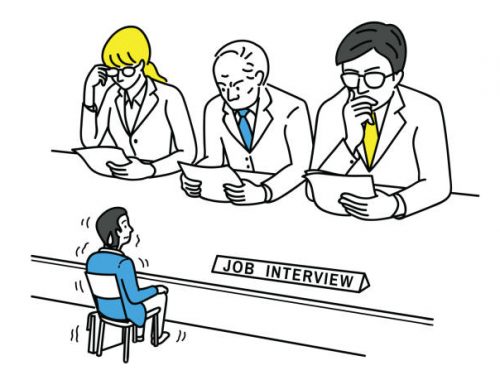
Simulated Interrogation
18 February 2022
Finding the Right Balance: My Simulated Interview Experience
14 February 2022

